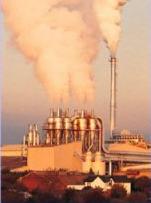The Minister for the Environment John Gormley, this morning published a Bill (statement below) that sets a target of 2.5% cuts in emissions on 2008 levels each year until 2020. The Bill sets a medium-term goal of a 30% cut on 1990 levels by 2030. By comparison, the EU Commission stated last May that the EU’s current trajectory would see a drop of only 25% by 2030.
The main current EU target is a reduction in carbon emissions of 20% below 1990 levels by 2020.
The new legislation will establish tackling climate change as a national priority in

Unsurprisingly, the influential farmers’ lobby is furious. Agriculture will almost certainly have to take some sort of hit if
The Irish Farming Association (IFA) President, John Bryan, has rubbished the Green Party’s decision to prioritise the Climate Change Bill as “badly thought out.”
“We have a low carbon model of food production and Government policy must not undermine the sector’s ability to drive exports and jobs as part of our economic recovery,”
The IFA's inevitable opposition is unlikely to ruin Christmas for Gormley et al, who seem more worried about their legacy at this stage of the (end) game, than courting popularity with rural voters.
The only nod to farmers' interests in Ministers' Gormley's and Ryan's statement is a couple of very vague paragraphs tacked onto the bottom. These are to do with agriculture and forestry's potential for sequestration, which is when emissions are offset by trees and plants absorbing atmospheric carbon.
The climate law is due to be enacted in February, a few weeks at most before the Dáil is likely to be dissolved ahead of the general election. (Bookmaker Paddy Power is offering 8/11 odds on no Green TDs being returned).
Friends of the Earth today backed the Green Party legislation and accused the IFA of “scaremongering.”
The organisation’s director in
“It [the Bill] will prevent the next bubble, one driven by a belief that pollution can rise forever without leading to a crash," Coghlan said last week.








 3. Thursday, November 4: UCD's Earth Sciences Institute will host a seminar on Smart Cities, addressed by Michael Roche of IBM and chaired by Dublin City Council planner Dick Gleeson. It's at 12.30pm in the Wood Quay bunkers.
3. Thursday, November 4: UCD's Earth Sciences Institute will host a seminar on Smart Cities, addressed by Michael Roche of IBM and chaired by Dublin City Council planner Dick Gleeson. It's at 12.30pm in the Wood Quay bunkers.









